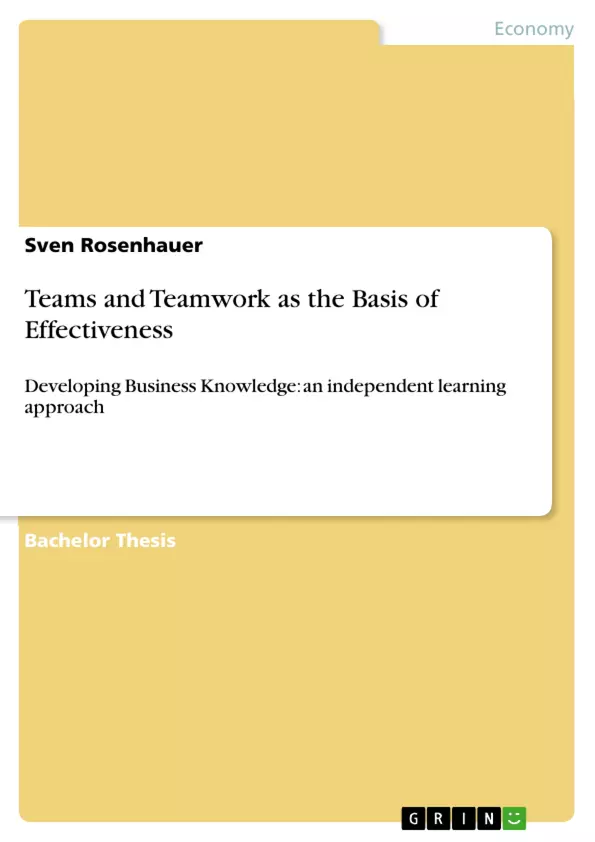Teams and teamwork can be found in every organisation. A critical literature review on teams and team building is given. Assumptions concerning defining, evaluating and building teams are stated. Understandings of the topic vary significantly. Teams are seen as co-operations of individuals which are working together to accomplish given tasks. Also advantages and disadvantages differ within the topic depending on the philosophical approach. Advantages of teams are well understood but less proved. Team building is highlighted by two different frameworks. Statements about effective teamwork are reviewed an evaluated. Additionally, the system model as a framework for effective teamwork is illustrated and discussed. Core components like communication, shared beliefs, leadership and shared decision-making, training, and selection are explained. Arguments about teams and teamwork are mainly based on secondary research and narratives rather than primary research. The contrariness of the topic can be explained by a lack of research. Furthermore, methods and methodologies as well as suggestions for further research and limitations are illustrated.
Table of Contents
- Introduction
- Literature Review
- Understanding of the Topic
- Defining Teams
- Evaluating Teams
- Building Teams
- Effective Teamwork
- Core Components of Effective Teams
- Communication
- Goal Setting & Vision Sharing
- Leadership & Decision-Making
- Team Training & Development
- Team Selection & Recruitment
- Further Core Components
- Methods and Methodology
- Further Research
- Limitation of the Literature Review
Objectives and Key Themes
This literature review critically examines the existing research on teams and teamwork, focusing on effective team performance. It aims to provide a comprehensive overview of the topic, including definitions, evaluations, building strategies, and core components of effective teamwork. The review utilizes Bloom's taxonomy for evaluating the literature and considers various philosophical approaches.
- Defining and characterizing teams and teamwork
- Evaluating the effectiveness of teams and teamwork
- Strategies and methods for building effective teams
- Core components contributing to effective teamwork (communication, leadership, etc.)
- Methodologies and approaches for researching teams and teamwork
Chapter Summaries
The Introduction establishes the prevalent use of teams in organizations and highlights the increasing interest in understanding teamwork's effectiveness. The Literature Review section discusses the challenges in researching teams and presents a framework for the subsequent analysis. The Understanding of the Topic section explores the inconsistencies and complexities in defining and characterizing teams and teamwork. The Defining Teams section delves into various definitions of teams from different perspectives, emphasizing the functionalist and interpretivist approaches.
Keywords
Teams, teamwork, team building, effective teamwork, team performance, leadership, communication, goal setting, team selection, research methodologies, organizational effectiveness.
Frequently Asked Questions
What defines an effective team?
Effective teams are characterized by clear communication, shared beliefs, strong leadership, shared decision-making, and appropriate training.
What are the main advantages of teamwork in organizations?
Teamwork allows for the cooperation of individuals to accomplish complex tasks, though advantages vary depending on the organizational philosophy used.
What is the "system model" for teamwork?
The system model provides a framework for understanding how different components like input, process, and output contribute to team effectiveness.
Why is there a lack of primary research on team building?
Many arguments about teamwork are based on secondary research and narratives rather than empirical primary studies, leading to inconsistencies in the field.
How does leadership influence team performance?
Leadership is a core component that facilitates shared decision-making and ensures the team remains aligned with its goals and vision.
- Citar trabajo
- Sven Rosenhauer (Autor), 2005, Teams and Teamwork as the Basis of Effectiveness, Múnich, GRIN Verlag, https://www.grin.com/document/119451



